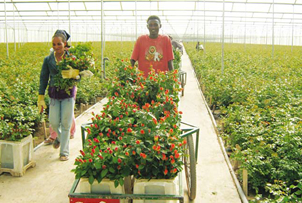 The Ethiopian flower industry is flourishing, with the help of government incentives and low labor costs.
The Ethiopian flower industry is flourishing, with the help of government incentives and low labor costs.
The country is now the second-largest flower exporter in Africa, with over 100 flower growers on 1,700 hectares (17, 000, 000 square meters or 182,986,477 square feet).
“We are now second in Africa only to Kenya, and we expect to overtake them soon,” Berhanu Ludamo, Promotion and Information Service Head of Ethiopian Horticulture Producers Exporters Association said.
“Ethiopia earned $250 million from horticulture export in 2014. The amount is expected to increase this year due to the expansion of horticulture farms.” Berhanu said. The area will grow to 3,000 hectares Fontana Flowers will begin operation of its horticulture farm in Ethiopia at the cost of 11 million dollars.
The company has leased a 100 ha land at Wenjeta and Wegelta kebeles 20 Km from Bahir Dar in the Amhara Regional State. Currently Fontana, which has hired 1,300 employees, is clearing land for growing roses and for warehouse construction. The company will exclusively grow different cut rose varieties. It will first start growing on 65 ha, with a target revenue of 95.9 million US$ a year.
The company will export to the traditional markets in the Netherlands, but it also has other direct markets in the Middle East. Four horticulture companies are already in operation in Bahir Dar. In addition to Fontana, three other India-based companies have acquired investment licenses and land to engage in the horticulture sector. 90 ha of land is allocated to the companies with expected export revenue of 4.1 billon Br, Daniel said.
With the number of companies engaged in the flower exports currently reaching 90, more than 1,442 ha of land are under flower cultivation countrywide. The horticulture sector in general has developed above 12,552 ha of land, according to data obtained from Ethiopian Horticulture Development Agency (EHDA). in the coming five years and the revenue is projected to increase to $550 million, according to Berhanu.
Climate is a major competitive advantage. Parts of the country south of Addis Ababa are 2,000 meters (6,561 feet) above sea level, and this makes it an ideal environment for floriculture, according to Shiferaw Mitiku, a researcher and agricultural marketing consultant in Addis Ababa.
“The export-oriented agricultural policy, attractive incentives, macro-economic stability and cheap labor constitute the competitive edge for the Ethiopian flower industry,” he said.
According to Ethiopian Investment code 2001, flower growers are offered “a fiveyear tax holiday, duty free imports, access to bank loans and farm lands as well as a 100 percent exemption from payment of export customs duties.” Berhanu said the competitive advantages are attracting foreign flower growers. “They are coming from Kenya, Tanzania and Uganda and from Ecuador,” Shiferaw said. The Netherlands, which is the world center of the flower trade, is also investing in local flower farms.


